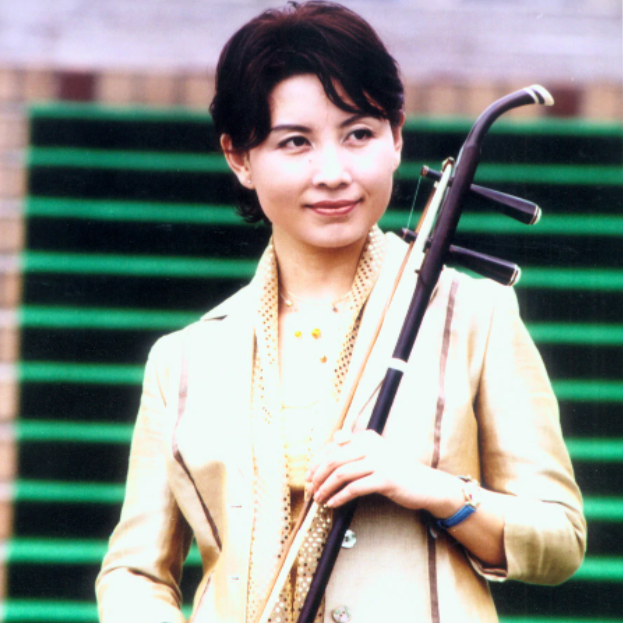Ma Xiaohui

Ma Xiaohui, graduated from Shanghai Conservatory of Music, studied under the famous erhu educator Professor Wang Yi.
National first-class actor, famous erhu performer, member of Shanghai CPPCC, member of United Nations Oriental Art Center Shanghai; art director of Hong Kong Youth Music Association, art director of Ningbo Folk Orchestra, visiting professor of School of Humanities of Southwest Jiaotong University, "Special Olympics" love ambassador, Director of Shanghai Xiaohui Art Center. Nominated for the first "Top Ten Outstanding Young Actors in Shanghai".
As an international Chinese folk music performer, she has toured dozens of countries and regions in Europe, America, Asia and Africa. For more than ten years, he has performed with the Berlin Philharmonic Chamber Orchestra, the French National Symphony Orchestra, the American Chamber Orchestra, the Japan NHK Symphony Orchestra, the Mexican National Symphony Orchestra, the Florence Chamber Orchestra of Italy, the Stavanger Symphony Orchestra of Norway, and the Hong Kong Philharmonic Orchestra. Dozens of world-renowned orchestras have held more than 300 solo recitals and lectures. Beethoven Hall in Germany, Musikverein in Vienna, Austria, Kennedy Center in the United States, Capitol Hill, Grand Théâtre des Champs-Élysées in France, Grand Théâtre de Montréal in Canada, Stavanger Concert Hall in Norway, Prague Spring Concert Hall in Czech Republic, NHK National Concert Hall in Japan And so have left her footprints. In June 2006, Ma Xiaohui cooperated with the well-known piano musician Tim Ovens to perform the music special of "Erhu and Piano" at the famous Kennedy Center in Washington. In July, she was invited by Helsinki, the capital of Finland, to become the first Chinese folk musician to attend the World Music Festival in Finland. At the "Bad Kissingen Festival" in Germany, she, together with pianists Lang Lang and Li Yundi, as representatives of Chinese performers, brought powerful music to the local people. The German local newspaper Donaukurier wrote incisively: "Ma Xiaohui is an outstanding erhu player, her two strings play enchanting sound effects like magic. Ma Xiaohui has a superhuman artistic and musical perception, and she poetically imitates birds. Songs, elegy, comedy dialogues, etc., through this highly creative artist, these different traditional Chinese elements are integrated with Western modern elements."
As an active propagandist for the promotion of Chinese folk music, she has also worked in dozens of Chinese and foreign universities such as the University of Notre Dame, Northwestern University, University of Michigan; University of London; Taiwan University; Fudan University, Jiaotong University, Tongji University, Southwest Jiaotong University, etc. Lectures are taught.
As an active social musician, she actively participates in various cultural activities and has won many awards and honorary titles, such as the "First Prize (Gaohu) of the National Guangdong Music Performance Invitational Competition" in 1987; Cup Elegant Art Award"; 2001 "Shanghai Spring First International Music Festival Outstanding Performance Award"; "20th Century Outstanding Figure", "International Cultural Messenger", "International Outstanding Woman" awarded by the Cambridge Center and the American Biographical Institute , China's "Bid for the 2010 Shanghai World Expo" and other honors and awards at home and abroad; in the film music "Crouching Tiger, Hidden Dragon", which won 36 global music awards including the 73rd Academy Award for Best Film Soundtrack Erhu solo. And in the Asian region premiered "Erhu Concerto "Crouching Tiger, Hidden Dragon". She has successively collaborated with German DW International Radio, Japan Royal Records, Korea Records, Hong Kong Polygram Records, Hong Kong Universal Records, Marco Polo Records, China Baileys Records, Shanghai Wenyi Audiovisual Publishing House, etc. He has co-recorded more than 40 personal erhu albums, and a set of personal DVD albums "The Piano Players Without Borders". At the end of 2007, he will cooperate with Literature and Art Publishing House again to launch the biography of "Erhu Shaking Hands with the World".
As a successor of the erhu art, she loves tradition and does not stick to the dogma of a certain genre. She dares to choose her own repertoire in different styles and fields, and creatively adopts many unconventional performances. Techniques and colorful bowing methods enrich the sound effect and performance potential of the erhu. She has a very sensitive musical sense, at the same time, she is good at thinking and daring to innovate, so she has a very keen analytical ability and control ability for various works, and gradually forms her unique style. At the same time, she also has an international musical vision. She firmly believes that nationalized music has eternal vitality only when it is integrated into the world. She put forward higher requirements for herself. In September 2003, she went to the University of Notre Dame as an exchange scholar. The University of Michigan studied music composition, music education psychology and performance psychology and other related majors.
In the past three years, she has started the concerts, tours and recordings and videos of "Erhu Shaking the World" all over the world, which is deeply loved by audiences at home and abroad.
Ma Xiaohui is also an active participant and practitioner of the new creation of contemporary Chinese erhu music, "Elegy", "Introduction, Chanting and Allegro", "Orchid Flower Ballade", "Genghis Khan", "Tianshan Shepherdess", "Farewell" , "Desert Twilight", "Deep Night" and many other new erhu concertos were successfully premiered by her; at the same time, she also participated in the creation of her own works. , she also vigorously promoted erhu music to the world music stage, and adapted and transplanted a large number of Chinese and foreign works for this purpose, such as "Six Romanian Dances by Bartok", "Bach - Originality, Sonata", "Chrysler - The Sorrow of Love", etc. .
More than ten years of professional music career has made Ma Xiaohui's piano skills increasingly mature and perfect, and gradually formed a very personal and charming playing style, which has won the praise of many experts and the recognition and love of the audience.
 渝公网安备 50010702504639号
渝公网安备 50010702504639号